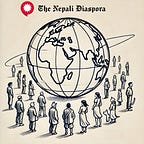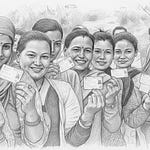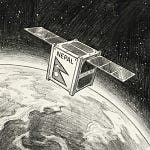🚀 Exciting Update! We now have a domain for easier access: nepalidiaspora.net. Plus, you can find our podcast on popular platforms like Spotify. listen on the go or read the full text below! 🎧📖
Nepal grapples with rising fuel prices, a U.S. aid freeze disrupting key projects, and a controversial social media bill. Meanwhile, an HPV vaccination drive begins, Taplejung protests escalate, and cybersecurity efforts gain momentum.
Key updates below. ⬇️
Economy & Development 💸
The Nepal Stock Exchange (NEPSE) gained 24.50 points (+0.93%) on January 28, 2025, closing at 2,657.77 with a daily turnover of Rs 9 billion. The Development Bank sector led gains (+4.07%), while Upakar Laghubitta and Sikles Hydropower surged 10%. Despite the positive trend, 60 companies declined, reflecting mixed sentiment. Total market capitalisation hit Rs 4.409 trillion, signalling steady investor confidence. (THT).
The Nepal Oil Corporation (NOC) announced a fuel price hike effective January 31, 2025, with petrol increasing by Rs 2 per litre and diesel by Rs 4 per litre. Linked to revised tariffs from the Indian Oil Corporation, the new rates set petrol at Rs 167 and diesel at Rs 160 per litre in Kathmandu, alongside higher aviation fuel prices. This adjustment is expected to strain transportation costs and inflation, adding pressure on consumers and businesses already grappling with economic challenges. (Ktm Post).
On a positive note, the Birgunj Customs Office reported a 100% increase in exports during the first six months of the current fiscal year, reaching Rs 29.27 billion. This growth was driven by higher exports of processed soybean and sunflower oil to India. However, imports also grew by 6.45%, reaching Rs 277.15 billion, indicating a widening trade deficit. While the export surge is encouraging, sustained efforts are needed to balance trade and reduce dependency on imports (THT).
Nepal’s progress on Sustainable Development Goals (SDGs) remains slow, with only 41.7% achieved as of 2025. The National Planning Commission cites financial constraints, global inflation, and pandemic aftershocks as major hurdles.
Meanwhile, the farmer registration initiative—aimed at streamlining subsidies—has been sluggish, with just 2 million farmers registered out of 4.13 million households since 2021, highlighting implementation challenges.
On a brighter note, the 77.5 MW Ghunsa Khola Hydropower Project secured Rs 12.7 billion in investments, reinforcing Nepal’s push for renewable energy and economic growth. (My Republica).
Nepal’s development efforts have hit a roadblock as the U.S. freezes foreign aid, disrupting key projects in health, agriculture, and education. Critical initiatives like disease surveillance, food security, and outbreak training are now paused, affecting hundreds of NGOs and nonprofits reliant on USAID funding.

The move, part of Trump’s “America First” policy, shifts U.S. strategic priorities, sidelining support for nutrition, climate change, and LGBTQI initiatives. While the Millennium Challenge Corporation (MCC) remains unaffected, this highlights Nepal’s dependence on foreign aid and the urgent need to diversify funding sources. Experts believe the freeze is temporary but warn of long-term geopolitical challenges.
Social & Cultural ⭐
Nepal has launched a nationwide HPV vaccination campaign to protect 1.6 million girls (ages 10–14) from cervical cancer. Running Feb 4–18, the free drive prioritises schoolgirls and out-of-school adolescents, with Manisha Koirala as goodwill ambassador. A major step in public health, this initiative aims to save thousands of lives annually. (Rising Nepal).
Meanwhile, doctors across Nepal are advocating for fair stipends, safer workplaces, and regulated working hours, highlighting the need for systemic reforms to improve healthcare delivery and retain skilled professionals (Online Khabar).
In Taplejung, the ‘No Cable Car Group’ continues protests against a controversial cable car project, citing threats to indigenous Limbu culture and sacred sites. Clashes with police have escalated tensions, sparking a nationwide debate on balancing development with cultural and environmental preservation. (Ktm Post).
On a brighter note, Chitwan National Park has begun relocating four rhinos internally to balance habitat distribution and boost breeding, a move that reflects Nepal’s ongoing success in wildlife conservation. With 752 rhinos nationwide, this effort underscores the country’s commitment to protecting its natural heritage (Ktm Post).
Additionally, excavation and research have begun at Uku Mahal in Darchula, a site believed to be the 12th-century capital of the Katyuri dynasty. This initiative aims to preserve Nepal’s rich cultural heritage, with archaeologists working to safeguard ancient stone inscriptions and idols (Rising Nepal).
While road safety remains a pressing issue, with 75 daily accidents claiming seven lives on average, these challenges are being met with calls for stricter enforcement and public awareness campaigns to reduce speeding and drunk driving (Ktm Post).
Politics & Governance 🪧

The government has introduced a controversial bill to regulate social media, proposing severe penalties for spreading fake news, hate speech, and cyberbullying, with offenders facing up to five years in prison and fines of up to Rs 1.5 million. While the bill aims to curb misinformation and protect national interests, critics argue it threatens freedom of expression and press freedom, prompting calls for stakeholder consultations to ensure alignment with constitutional and human rights principles. (The Himalayan Times)
To tackle widespread financial misconduct, the government has set up the National Cooperative Regulatory Authority (NCRA) to monitor fraud, embezzlement, and mismanagement in cooperatives. While aimed at restoring public trust, some operators worry about potential restrictions on growth. (My Republica, Rising Nepal Daily)
The National Cyber Security Centre has issued a 102-point advisory to bolster government website and data security amid rising cyber threats. Key measures include regular updates, multifactor authentication, and public awareness. Centre Director Raj Kumar Maharjan urges citizens and officials to adopt these practices, aiming to protect critical systems and build a cybersecurity culture nationwide. (Onlinekhabar)
Did you know ❓
Long before the Bikram Sambat calendar, indigenous communities like the Kirati people observed Yele Sambat, an ancient lunar calendar dating back over a millennium. Still echoed in local rituals and festivals, Yele Sambat symbolizes Nepal’s rich cultural mosaic and pre-modern heritage, inspiring efforts to preserve ancestral traditions across generations.
Sources 🗞️
We went through a lot of articles from this last week so you don’t have to 🙂. To not clutter here, links to all sources used for the newsletter are available in this folder.
Let’s connect
What do you think? Share your thoughts or suggest topics for next week—let’s keep the conversation going! Feedback form | Facebook | LinkedIn
About Nepali Diaspora Digest:
The Nepali Diaspora Digest connects the global Nepali community with curated news, insights, and stories that matter most. Join us as we celebrate and explore the diverse voices and achievements of Nepalis worldwide.
Partner shout out
belayat.uk: helping Nepalis connect in the UK on jobs, housing, events and finding local nepali owned businesses















